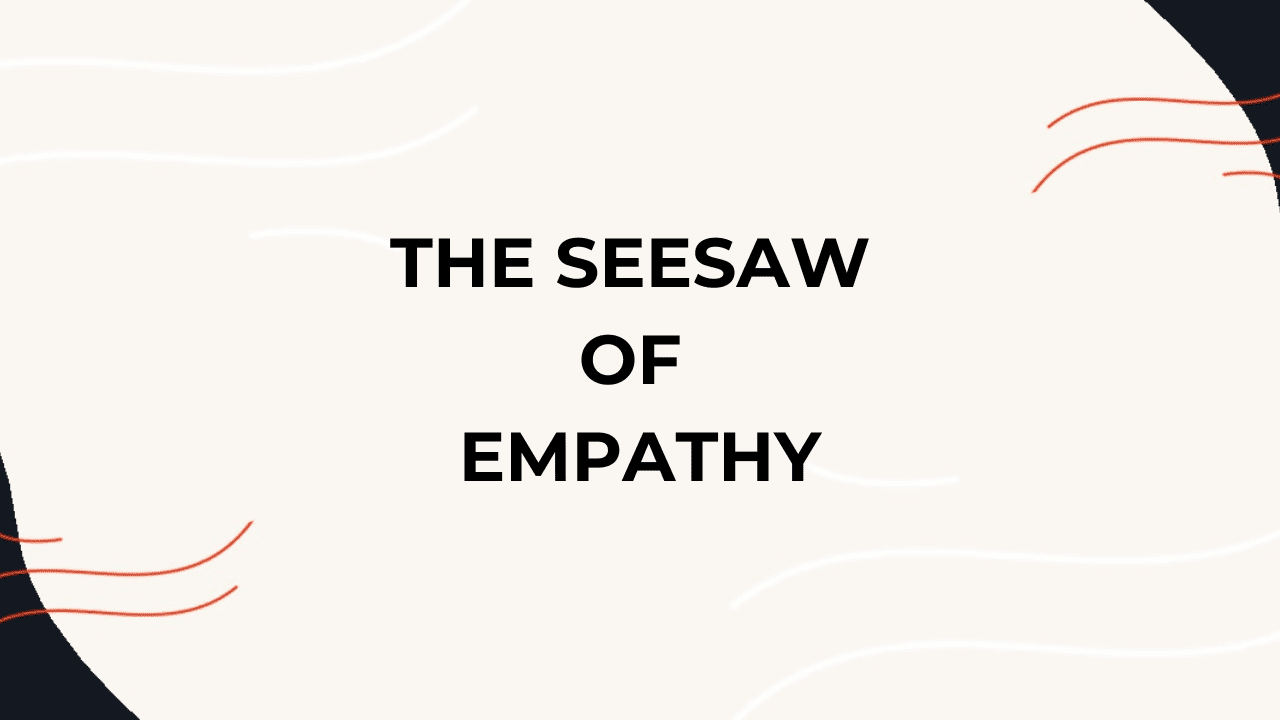The Seesaw of Empathy states that the less experience you share with a client, the more empathy you have to demonstrate. It’s common for a coach to academically understand the people they work with but not get them.
A male coach, for example, will never know what it’s like to give birth. They might academically understand what it’s like. But they won’t ever really know what it’s like. Their capacity to learn about a woman’s experience is limited unless they’re Arnold Schwarzenegger in the, admittedly super weird, movie Junior and they take an experimental fertility drug ’Expectane’.
In a similar vein, a male coach can learn about women’s changing hormones during peri- and post-menopause. He can read about the impact that they have. But he can never really know what those changing hormones feel like.
This doesn’t mean that men cannot effectively coach women. It does, however, require a man to recognize that he lacks a shared experience with the woman he’s coaching. As a result, the male coach must both lead with empathy and seek out experiential resources in additional to the academic stuff.
The Seesaw of Empathy concept comes from Ren Jones. In his words, he’s a “cis-gendered heterosexual unmarried male with no children who works exclusively with mothers”.
Ren described to me the moment he realized just how little he ‘got’ about his clients. He was reading about peri– and post-menopause. The first book he read was called Menopause Manifesto by Dr. Jane Gunter, which he described as ‘very clinical’. The second book he read was Next Level by Dr. Stacy Sims which helped him understand women’s shifting hormones in their athletic careers.
Then he read Menopocalypse by Amanda Thebe. In Ren’s words,
“There’s one section in the book where she talks about brain-derived neurotrophic factor (BDNF), which regulates your cognitive ability, and how it decreases for many women when they go through this process.
“Amanda described her son recalling a time when he played basketball. Amanda had no memory of her son playing basketball. She said “at that moment, I was deathly afraid I was headed head-first for alzheimer’s.”
Before reading Amanda’s book, Ren had an intellectual understanding of BDNF. He understood it, but he didn’t get it. “I had never interpreted the experience in any way other than clinical.” He said.
In Zack’s case from our previous section, he’s his client. He’s lived their life. He was a college football player. It’s reasonable for him to assume that he understands many of the emotions and pressures ex-athletes reintegrating themselves into society feel. While it’s valuable for Zack to still have empathy for his clients, he’s on the opposite end of the seesaw from somebody like Ren.
Then there’s an online marketing coach for women I’ll call Jenny who doesn’t get it. She’s in her 40’s, has no kids, and travels the world with her boyfriend. Inherently there’s nothing wrong with Jenny’s situation. Her problem is that she doesn’t realize just how little shared experience she has with the women she coaches that have young children.
Jenny’s hired to help build side hustles. She markets to mothers and promotes her services as a way to build an income on the side in addition to a full time job. People who don’t have kids don’t get what it’s like to have kids. They can read about it and think “oh, they’re busy. I get it.”
No, you don’t. And, you can’t. Also, you won’t. Ever.
Jenny’s women told her they didn’t have the time to build complicated sales funnels, create daily content, and write multiple versions of emails for multivariate testing. She’d respond with a vapid motivational phrase and tell them that if they wanted it bad enough, they’d do it.
So one day, her clients staged a coup.
One day, they all showed up to the group video training led by Jenny with their children. It was described to me as ‘complete chaos’.
I hope Jenny gets it a bit more now.
According to Ren, there’s two concepts to consider when you want to learn about others’ experiences.
The first is cultural humility, which is an appreciation of when you’re outside of a culture when interacting with that culture.
The second is the phrase “nothing about us without us” that comes from disability activism during the 1990s.
Do you have a shared experience with your clients? If so, great. If not, that’s also fine but recognize it, demonstrate cultural humility for a situation you can’t actually live, and learn from as many experiential resources as you can.
Once you decide to learn about your clients experiences, there are a number of ways to immerse yourself in their world.
The first is to read more experiential books like Menopocolypse. Don’t stop your study at the science. Listen to the language that experts, who are also a member of the community they write for, use to describe their experiences.
Then, use social media to immerse yourself in groups to learn deeper about their shared experience. For example, Ren follows lifestyle and self-development leaders who connect with women. What the leader says is valuable, but what he says helps the most is reading the comments and reactions of people who follow these leaders.
There doesn’t have to be a structure to your immersion. This isn’t study in the conventional sense. Instead, it’s learning through the experience of others. According to Ren, “you cannot immerse yourself in another language and culture authentically and not see your empathy level for that group of people rise.”
“I’ll never forget that I’m not native.” Ren says. “But my goal is to feel fluent.”










